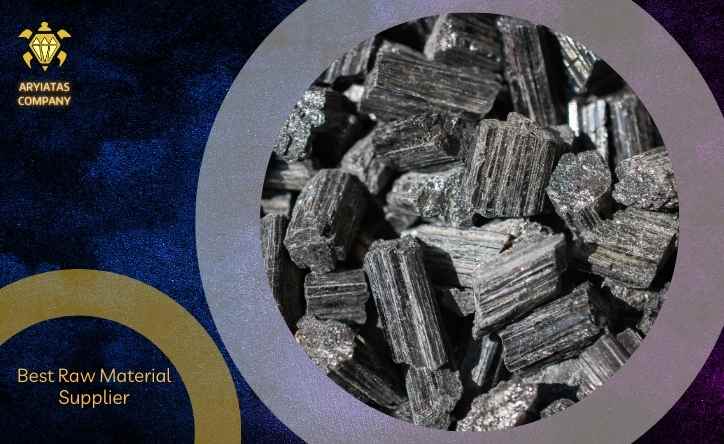Introduction
In today’s world, where environmental concerns are paramount and consumers are increasingly conscious of the products they use, the demand for natural raw materials has reached new heights. Natural raw materials are the building blocks of countless products, ranging from cosmetics to textiles, and they play a crucial role in sustainable and environmentally friendly production processes.
This article delves into the realm of natural raw materials, exploring their significance, applications, and the benefits they offer. From understanding the concept of natural raw materials to their impact on various industries, we will embark on a journey that highlights the essence of sustainability and quality in today’s world.
Natural Raw Materials: An Overview
Natural raw materials, as the name suggests, refer to substances derived from nature that are used in the manufacturing of various products. These materials are sourced from the earth’s natural resources, such as plants, animals, and minerals, and they undergo minimal processing to retain their inherent properties.
The Definition and Significance of Natural Raw Materials
Natural raw materials are fundamental substances derived from nature that serve as the basis for countless products. These materials are sourced directly from the earth’s natural resources, including plants, animals, and minerals. Unlike synthetic alternatives, natural raw materials undergo minimal processing, preserving their inherent properties and minimizing their impact on the environment.
The significance of natural raw materials lies in their ability to provide sustainable and environmentally friendly solutions across various industries. By utilizing these materials, manufacturers can reduce their reliance on non-renewable resources and minimize the ecological footprint of their products. Natural raw materials offer an alternative to chemically synthesized ingredients, allowing for the production of goods that align with the growing demand for eco-conscious and socially responsible options.
Moreover, natural raw materials often possess unique qualities and beneficial attributes that make them highly desirable in product formulations. Their organic nature allows for compatibility with human biology, making them safer and gentler on the skin, body, and environment. From skincare and personal care products to textiles and food, natural raw materials enhance the quality and performance of end products while promoting a more sustainable approach to production.
Overall, the definition and significance of natural raw materials lie in their ability to bridge the gap between consumer demand for high-quality products and the need for environmentally friendly alternatives. By harnessing the potential of these materials, we can embrace a more sustainable future that prioritizes both the well-being of individuals and the health of the planet.
The Environmental Implications of Natural Raw Materials
The use of natural raw materials has significant environmental implications that contribute to the overall sustainability of various industries. One of the key environmental advantages of natural raw materials is their renewable nature. Unlike synthetic alternatives, which are often derived from finite resources like fossil fuels, natural raw materials are sourced from renewable sources such as plants and minerals that can be replenished over time. This renewable aspect reduces the pressure on non-renewable resources and helps preserve natural ecosystems.
Furthermore, natural raw materials typically have a lower environmental impact compared to synthetic counterparts. The extraction and processing of natural raw materials often involve less energy consumption and result in fewer greenhouse gas emissions. Additionally, the biodegradable nature of many natural raw materials ensures that they can break down naturally in the environment without leaving behind harmful pollutants or contributing to long-term waste accumulation.
By choosing to incorporate natural raw materials into manufacturing processes, industries can reduce their carbon footprint, conserve resources, and minimize pollution. These environmental implications highlight the importance of embracing sustainable practices and utilizing natural alternatives to drive positive change in our quest for a greener and more sustainable future.
The Role of Natural Raw Materials in Sustainable Development
Natural raw materials play a crucial role in promoting sustainable development across various sectors. Their utilization aligns with the principles of sustainability by fostering economic growth, social well-being, and environmental protection. By incorporating natural raw materials into production processes, industries can create a more balanced and harmonious relationship between human activities and the natural world.
One aspect of the role of natural raw materials in sustainable development is their contribution to economic growth and job creation. The extraction, processing, and utilization of these materials often involve local communities, providing employment opportunities and supporting local economies. Moreover, industries that prioritize the use of natural raw materials tend to establish long-term partnerships with suppliers, creating stable and sustainable supply chains that benefit both producers and consumers.
Another important aspect is the environmental aspect of sustainable development. Natural raw materials, being derived from renewable sources, contribute to the conservation of natural resources and biodiversity. By relying on these materials, industries can reduce their dependency on non-renewable resources and minimize the environmental impact of their activities. Additionally, the use of natural raw materials often results in lower carbon emissions and reduced pollution, contributing to a healthier and more sustainable environment for present and future generations.
In summary, the role of natural raw materials in sustainable development is multifaceted. They promote economic growth, support local communities, and foster environmentally responsible practices. By embracing these materials, industries can contribute to a more sustainable and equitable world, where economic prosperity goes hand in hand with social well-being and environmental stewardship.
Exploring the Applications of Natural Raw Materials
The versatility of natural raw materials is evident in their wide range of applications across multiple industries. From enhancing the quality of personal care products to revolutionizing the textile industry, natural raw materials are at the forefront of innovation and sustainability.
Natural Raw Materials in the Cosmetics Industry
Natural raw materials have gained significant traction in the cosmetics industry, offering a plethora of benefits for both manufacturers and consumers. These ingredients, sourced from plants, minerals, and even marine life, provide a sustainable and eco-friendly alternative to synthetic chemicals.
Natural raw materials not only enhance the quality and efficacy of cosmetic products but also cater to the increasing consumer demand for natural, organic, and cruelty-free options. From nourishing plant extracts like aloe vera and chamomile to mineral-based pigments and natural oils, these ingredients contribute to the creation of skincare, haircare, and makeup products that promote healthier skin, hair, and overall well-being.

Natural Raw Materials in the Textile Industry
Natural raw materials have a significant presence in the textile industry, offering sustainable and versatile alternatives to synthetic fibers. From plant-based fibers like cotton, linen, and hemp to animal-derived fibers such as silk and wool, natural raw materials provide a range of options for textile production. These materials are known for their breathability, comfort, and durability, making them ideal for a variety of textile applications.
Moreover, natural fibers are biodegradable, reducing environmental impact and promoting circularity in the industry. With growing consumer demand for sustainable and ethically produced textiles, natural raw materials play a vital role in creating eco-friendly fabrics that combine style, functionality, and environmental consciousness.
Natural Raw Materials in the Food and Beverage Industry
Natural raw materials play a pivotal role in the food and beverage industry, providing a foundation for creating nutritious, flavorful, and sustainable products. From fruits and vegetables to grains and spices, natural raw materials form the essence of culinary creations. These ingredients offer a multitude of health benefits, including essential nutrients, vitamins, and antioxidants.
In addition to their nutritional value, natural raw materials contribute to the sensory experience of food, enhancing taste, aroma, and texture. Moreover, the use of natural ingredients aligns with consumer preferences for clean labels, organic products, and sustainable sourcing practices. Natural raw materials enable the food and beverage industry to meet the demands of health-conscious consumers while promoting a more environmentally friendly approach to food production and consumption.
Natural Raw Materials in the Construction Industry
Natural raw materials play a crucial role in the construction industry, providing essential resources for building durable and sustainable structures. Materials such as wood, stone, clay, and sand are widely used in construction projects, offering strength, versatility, and aesthetic appeal.
Natural raw materials are renewable and can be responsibly sourced, reducing the industry’s impact on the environment. Additionally, these materials often have excellent thermal insulation properties, contributing to energy-efficient buildings. From timber for framing and flooring to natural stone for facades and landscaping, natural raw materials form the foundation of construction, blending functionality, aesthetics, and environmental consciousness.

The Benefits of Natural Raw Materials
When it comes to choosing between synthetic and natural ingredients, the advantages of natural raw materials become apparent. These benefits extend beyond their eco-friendly nature and encompass factors such as health, performance, and consumer preference.
The Environmental Benefits of Natural Raw Materials
The utilization of natural raw materials brings forth several environmental benefits. Firstly, these materials are renewable, reducing the depletion of finite resources. Secondly, natural raw materials often require less energy for extraction and processing, leading to reduced carbon emissions.
Thirdly, they have a lower environmental impact compared to synthetic alternatives, as they are biodegradable and leave behind minimal waste. Lastly, the use of natural raw materials promotes biodiversity conservation and supports sustainable land management practices.
The Health Benefits of Natural Raw Materials
Natural raw materials offer numerous health benefits. They are often free from harmful chemicals, allergens, and toxins, making them safer for human use and reducing the risk of adverse health effects. Additionally, natural raw materials, such as plant extracts and essential oils, possess inherent therapeutic properties that can promote skin health, soothe ailments, and enhance overall well-being.
The Performance Benefits of Natural Raw Materials
Natural raw materials offer performance benefits that rival or surpass their synthetic counterparts. They possess unique properties that enhance product efficacy, such as moisture retention in skincare products, breathability in textiles, and flavor enhancement in food and beverages, resulting in superior performance and consumer satisfaction.
Meeting Consumer Demands with Natural Raw Materials
Natural raw materials are an ideal choice for meeting the evolving demands of today’s consumers. As more individuals prioritize sustainability and seek out natural and organic options, incorporating these materials into products allows businesses to align with consumer values and preferences.
By offering a range of eco-friendly, clean label, and responsibly sourced options, companies can cater to the growing market demand for sustainable and transparent products, fostering trust and loyalty among consumers.

FAQs about Natural Raw Materials
As the interest in natural raw materials continues to grow, it’s important to address common questions and concerns that arise. Here are some frequently asked questions about natural raw materials:
FAQ 1: What are the most common natural raw materials?
Answer: Natural raw materials encompass a vast array of substances. Some of the most common ones include plant extracts like aloe vera and lavender, minerals like clay and mica, and animal-derived ingredients such as beeswax and lanolin.
FAQ 2: Are natural raw materials more sustainable than synthetic alternatives?
Answer: Yes, natural raw materials are generally considered more sustainable. They are renewable, biodegradable, and have a lower environmental impact compared to synthetic alternatives derived from fossil fuels.
FAQ 3: Can natural raw materials be used in organic products?
Answer: Absolutely! Natural raw materials are often the primary choice for formulating organic products. They align perfectly with the principles of organic certification, ensuring that products are made with natural and sustainable ingredients.
FAQ 4: Do natural raw materials perform as well as synthetic ingredients?
Answer: Natural raw materials have come a long way in terms of performance. With advancements in extraction techniques and formulation technology, natural ingredients now offer comparable or even superior performance to their synthetic counterparts.
FAQ 5: Are there any regulations or certifications for natural raw materials?
Answer: Yes, various regulations and certifications govern the use of natural raw materials in different industries. Examples include organic certifications, Fairtrade certifications, and regulations specific to sectors like cosmetics and textiles.
FAQ 6: Where can I find high-quality natural raw materials?
Answer: High-quality natural raw materials can be sourced from reputable suppliers and manufacturers. It is essential to choose suppliers who prioritize sustainability, transparency, and ethical practices in their sourcing and production processes.
Conclusion
In conclusion, natural raw materials hold immense value in our quest for sustainability and quality. From their eco-friendly nature to their myriad of applications, these materials have the potential to transform industries and contribute to a greener and more conscious future.
As consumers, it is important to support brands and products that prioritize the use of natural raw materials, driving positive change and fostering a more sustainable society. By embracing the essence of natural raw materials, we can make a tangible difference and shape a better world for generations to come.

